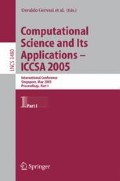Abstract
An algorithm for testing the relationship of a point and a simple polygon is presented. The algorithm employs a “visible edge” of the polygon from the point to determine whether the point is in the polygon or not according to the relationship of the orientation of the polygon and the triangle formed by the point and the visible edge. The algorithm is efficient and robust for floating point computation.
Access this chapter
Tax calculation will be finalised at checkout
Purchases are for personal use only
Preview
Unable to display preview. Download preview PDF.
References
Anglada, M.V.: Improved incremental algorithm for constructing restricted Delaunay triangulations. Computers & Graphics 21, 215–223 (1997)
Balbes, R., Siegel, J.: A robust method for calculating the simplicity and orientation of planar polygons. Computer Aided Geometric Design 8, 327–335 (1991)
Edelsbrunner, H., Mücke, E.P.: Simulation of simplicity: a technique to cope with degenerate cases in geometric algorithms. ACM Transactions on Graphics 9, 66–104 (1990)
Feito, F., Torres, J.C.: Inclusion test for general polyhedra. Computers & Graphics 21, 23–30 (1997)
Feito, F., Torres, J.C., Urena, A.: Orientation, simplicity, and inclusion test for planar polygons. Computers & Graphics 19, 595–600 (1995)
Forrest, A.R.: Computational geometry in practice. In: Earnshaw, E.A. (ed.) Fundamental Algorithms for Computer Graphics, pp. 707–724. Springer, Berlin (1985)
Haines, E.: Point in polygon straegies. In: Heckbert, P. (ed.) Graphic Gems IV, pp. 24–46. Academic Press, Boston (1994)
Hoffmann, C.M.: The problem of accuracy and robustness in geometric computation. IEEE Computer 22, 31–41 (1989)
O’Rourke, J.: Computational Geometry in C, 2nd edn. Cambridge University Press, Cambridge (1998)
Preparata, F.P., Shamos, M.I.: Computational Geometry - An Introduction. Springer, New York (1985)
Weiler, K.: An incremental angle point in polygon test. In: Heckbert, P. (ed.) Graphic Gems IV, pp. 16–23. Academic Press, Boston (1994)
Wu, H.Y., Gong, J.Y., Li, D.R., Shi, W.Z.: An algebraic algorithm for point inclusion query. Computers & Graphics 24, 517–522 (2000)
Author information
Authors and Affiliations
Editor information
Editors and Affiliations
Rights and permissions
Copyright information
© 2005 Springer-Verlag Berlin Heidelberg
About this paper
Cite this paper
Li, W., Ong, E.T., Xu, S., Hung, T. (2005). A Point Inclusion Test Algorithm for Simple Polygons. In: Gervasi, O., et al. Computational Science and Its Applications – ICCSA 2005. ICCSA 2005. Lecture Notes in Computer Science, vol 3480. Springer, Berlin, Heidelberg. https://doi.org/10.1007/11424758_79
Download citation
DOI: https://doi.org/10.1007/11424758_79
Publisher Name: Springer, Berlin, Heidelberg
Print ISBN: 978-3-540-25860-5
Online ISBN: 978-3-540-32043-2
eBook Packages: Computer ScienceComputer Science (R0)

